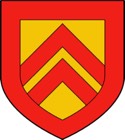Powys-Lybbe Forbears - Person Sheet
Powys-Lybbe Forbears - Person Sheet
NameWilliam III d' Albini Lord of Belvoir 
 [60, Ros art, Vol XI, p.90 seq], [54, His own article], [119, Willelm III de Albini Brito, pp. 272-3], [128], [121, Belvoir, Leics barony, p. 12]
[60, Ros art, Vol XI, p.90 seq], [54, His own article], [119, Willelm III de Albini Brito, pp. 272-3], [128], [121, Belvoir, Leics barony, p. 12]

 [60, Ros art, Vol XI, p.90 seq], [54, His own article], [119, Willelm III de Albini Brito, pp. 272-3], [128], [121, Belvoir, Leics barony, p. 12]
[60, Ros art, Vol XI, p.90 seq], [54, His own article], [119, Willelm III de Albini Brito, pp. 272-3], [128], [121, Belvoir, Leics barony, p. 12]Birthaft 1146
Death1232
GeneralOf Belvoir castle. Governor of Rochester castle.
FatherWilliam II d' Albini Lord of Belvoir (-1168)
MotherMaud FitzRobert (<1134->1168)
Spouses
2Agatha de Trussebut  [119, Her husband, Willelm III de Albini Brito, pp. 272-3], [119, Agatha Trussebut, p. 1130]
[119, Her husband, Willelm III de Albini Brito, pp. 272-3], [119, Agatha Trussebut, p. 1130]
 [119, Her husband, Willelm III de Albini Brito, pp. 272-3], [119, Agatha Trussebut, p. 1130]
[119, Her husband, Willelm III de Albini Brito, pp. 272-3], [119, Agatha Trussebut, p. 1130]FatherWilliam Trussebut (-ca1176)
MotherAlbreda de Harcourt (ca1135->1185)
Notes for William III d' Albini Lord of Belvoir
m. (1) N.N., (2) Agatha de Trussebut.
Was this the man who was Magna Carta Surety? Yes.
According to Keats-Rohan, Domesday descendants, he left a son and successor William IV d'Albini Brito.
Was this the man who was Magna Carta Surety? Yes.
According to Keats-Rohan, Domesday descendants, he left a son and successor William IV d'Albini Brito.
Armorial Blazon notes for William III d' Albini Lord of Belvoir
Both BOMC and NSMCD&B give him:
Gules a lion rampant Or.
Neither gives any sources, so this needs confirmation and/or further investigation.
Gules a lion rampant Or.
Neither gives any sources, so this needs confirmation and/or further investigation.
DNB Main notes for William III d' Albini Lord of Belvoir
Albini, or Aubeney, William de d. 1236
Name: Albini or Aubeney, William de
Dates: d. 1236
Active Date: 1216
Gender: Male
Field of Interest: Land Ownership, Royalty and Society
Occupation: Baronial leader
Sources: Dugdale's Baronage (1675), i. 113; Foss's Judges (1848), ii. 204.
Contributor: J. H. R. [John Horace Round]
Article
Albini, or Aubeney, William de d. 1236, baronial leader, grandson of William de Albini (Brito) (d. 1155-6) [q.v.] was son of William de Albini ‘Meschin,’ whom he succeeded in 1167-8. Sheriff of Rutland and other counties under Richard, he served as an itinerant justice in 1199, and on several occasions in John's reign. In the conflict between the crown and the baronage, he joined the moderate or middle section, who remained in attendance on the king till the eve of the Charter, but went over to the extreme party on their obtaining possession of London (24 May 1215). Accompanying them to Runnymede (15 June), he was elected one of the twenty-five barons of the Charter (Matt. Paris), but then withdrew to his castle of Belvoir, and, though included by name in the excommunication of the barons, refused to attend the Hounslow tournament (6 July). Prevailed upon, in the autumn, to return, he was placed in charge of Rochester, but was compelled after a gallant defence (11 Oct. to 30 Nov.) to surrender it to John, who instantly committed him to prison, and was narrowly dissuaded from hanging him (Gervase, Rolls Ser. ii. 110). In the following year (1216) he regained his liberty and estates by a fine of 6,000 marks, and, embracing the royal cause at the accession of Henry, was entrusted with a command at the battle of Lincoln (19 May 1217), and was subsequently high in favour. In 1219 and 1225 he again acted as an itinerant justice, and died in May 1236.
Sources
Dugdale's Baronage (1675), i. 113; Foss's Judges (1848), ii. 204.
Contributor: J. H. R.
published 1885
Name: Albini or Aubeney, William de
Dates: d. 1236
Active Date: 1216
Gender: Male
Field of Interest: Land Ownership, Royalty and Society
Occupation: Baronial leader
Sources: Dugdale's Baronage (1675), i. 113; Foss's Judges (1848), ii. 204.
Contributor: J. H. R. [John Horace Round]
Article
Albini, or Aubeney, William de d. 1236, baronial leader, grandson of William de Albini (Brito) (d. 1155-6) [q.v.] was son of William de Albini ‘Meschin,’ whom he succeeded in 1167-8. Sheriff of Rutland and other counties under Richard, he served as an itinerant justice in 1199, and on several occasions in John's reign. In the conflict between the crown and the baronage, he joined the moderate or middle section, who remained in attendance on the king till the eve of the Charter, but went over to the extreme party on their obtaining possession of London (24 May 1215). Accompanying them to Runnymede (15 June), he was elected one of the twenty-five barons of the Charter (Matt. Paris), but then withdrew to his castle of Belvoir, and, though included by name in the excommunication of the barons, refused to attend the Hounslow tournament (6 July). Prevailed upon, in the autumn, to return, he was placed in charge of Rochester, but was compelled after a gallant defence (11 Oct. to 30 Nov.) to surrender it to John, who instantly committed him to prison, and was narrowly dissuaded from hanging him (Gervase, Rolls Ser. ii. 110). In the following year (1216) he regained his liberty and estates by a fine of 6,000 marks, and, embracing the royal cause at the accession of Henry, was entrusted with a command at the battle of Lincoln (19 May 1217), and was subsequently high in favour. In 1219 and 1225 he again acted as an itinerant justice, and died in May 1236.
Sources
Dugdale's Baronage (1675), i. 113; Foss's Judges (1848), ii. 204.
Contributor: J. H. R.
published 1885

